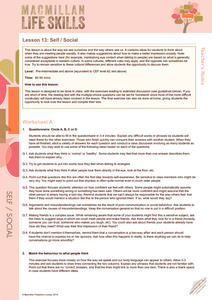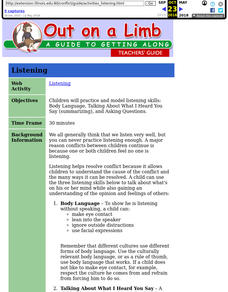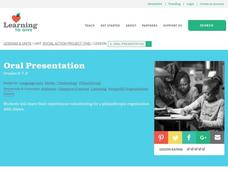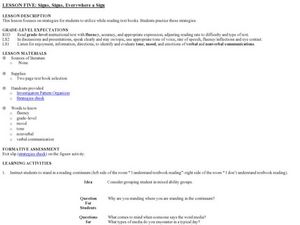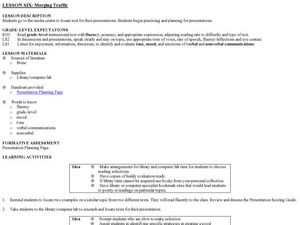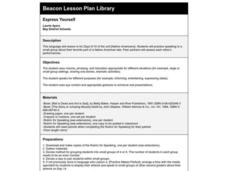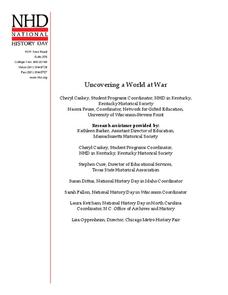King Country
Lesson 9: Communication - Day 2: Assertiveness
Appropriate assertive and non-verbal assertive communication is the focus of this lesson designed for the special education classroom. Using mirrors, class members practice assertive responses to a variety of situations.
Curated OER
Technology and the Human Eye
Fifth graders compare technology and the human eye. In this science instructional activity, 5th graders label the parts of the human eye and trace the path of light as it travels through the eye.
Curated OER
Watch the Road Signs
What makes a good speaker? Upper elementary learners practice oral fluency by working with a partner to read nonfiction books. While reading, they practice using correct tone of voice, making eye contact, and speaking clearly.
King Country
Lesson 8: Communication - Day 1: Non-Verbal Communication
As part of their study of communication skills, class members practice using verbal and non-verbal techniques to appropriately express their feelings.
Curated OER
Simply Speaking
Emerging orators distinguish between effective and ineffective public speaking strategies. They read a text that fits in with a Native Americans unit and speak about the text with both ineffective and effective volume, tone, phrasing,...
University of New Mexico
Lesson Plans and WebQuests
Students review an overview of mediation techniques and listening skills. They practice good listening skills which are needed for the mediation process and discuss icebreakers in pairs to better utilize good listening skills.
pelinks4u
Volleyball
Before coaching or beginning your next PE unit on volleyball, take a look at this 30-lesson unit that offers instructional techniques for each lesson, as well as warm-up activities, set inductions, and suggested coaching refinements.
Macmillan Education
Self/Social
Body language, our perception of others, and how to make a better impression socially are the focus topics for this lesson, which is part of a 23-lesson series on building important life skills. Learners complete a questionnaire on...
Curated OER
Lesson Seven: Watch Out For Pedestrians
Fifth graders practice their reading rate and fluency. In this fluency lesson plan, 5th graders practice speaking fast and slow in a variety of different character roles. They read with a buddy and have their fluency evaluated by their...
Hello-Hello
Portuguese – Learn Portuguese
Marcos and Paulo have just met Ana. Watch as they use Portuguese to introduce themselves and get to know each other. Language learners then complete a series of activities designed to help them master each brief conversation.
Curated OER
ADULT ESOL LESSON PLAN--Level 3--Obtaining Employment
Students, while examining an extensive list of vocabulary terms on the board, analyze how to exhibit appropriate behaviors and a positive image when going on job interview in order to make a good first impression with perspective...
Curated OER
Lead Up Skills fo Tchoukball
A simple lesson to practice the throwing and catching skills for the game of Tchoukball. There are several warm-up activities to have the class practice tossing a ball around. Then the main drill is organized much like a basketball...
Curated OER
A Guide to Getting Along: Listening
Here is an effective way to have your charges practice and model important listening skills. After a short review of effective active listening concepts, such as using body language, summarizing what the other person said, and asking...
Curated OER
Oral Presentation
Practice public speaking in this oral presentation lesson. Middle schoolers list the characteristics of a powerful speaker. They watch a video of two speakers, compare them and discuss the qualities of a good speech. Afterwards, they...
Curated OER
Fantasies and Myths
Fourth graders examine different types of literature, specifically myths and fantasy. They listen to "The Giving Tree", identify in which genre of literature it belongs, and view several myths on a website. At end of lesson, 4th...
Curated OER
Signs, Signs, Everywhere a Sign
Students brainstorm and discuss the strategies they use to read text books. In this reading text books lesson plans, students help each other on how to organize text book reading.
Curated OER
Communication – The Total Impact of Your Message
Students explore the facets of verbal and nonverbal communication. In this conflict resolution lesson plan, students discover multicultural communication dynamics as they discuss the implications of gesture and tone. Students practice...
Curated OER
The Twelve Days of Christmas
Fourth graders investigate the holidays by performing a song with their class. In this Christmas activity, 4th graders recite some of their favorite Christmas songs and read the lyrics to the song "The Twelve Days of Christmas."...
Curated OER
Playing in the Snow
Students practice dribbling and passing skills. In this basketball skills lesson, students rotate through a series of winter-themed stations with a partner and practice dribbling while jumping low hurdles, dribbling around "snowmen" and...
Curated OER
Merging Traffic
Students practice reading instructional texts. In this public speaking lesson, students complete a worksheet the help them prepare to read an instructional text aloud.
Curated OER
Express Yourself
Youngsters practice retelling a part of their favorite Native American tale to a small group of their peers. Peer partners assess each others performances. To keep comments positive and constructive, consider giving your class sentence...
Curated OER
Literature Study
Students create a PowerPoint presentation about a chapter book that they have read. They include what the book is about, they include characters, and a brief summary about the book.
National History Day
Uncovering a World at War
Has media always had an influence on public policy? After researching and reading news articles written during World War I, learners understand the influence of communication and media. They discuss articles in small groups and as a...
Curated OER
Giving An Oral Book Report
Students study techniques used to give an oral book report. They read their book, plan their thoughts, and write their report. Students present their book report to the class.







